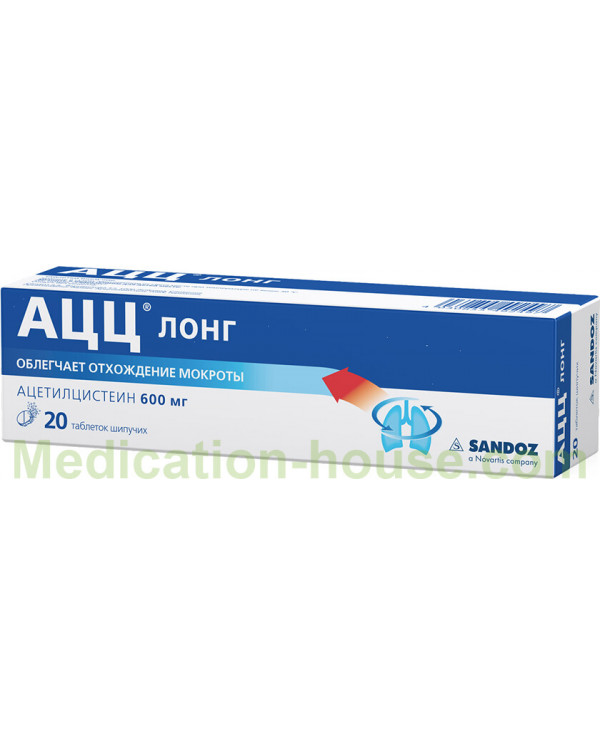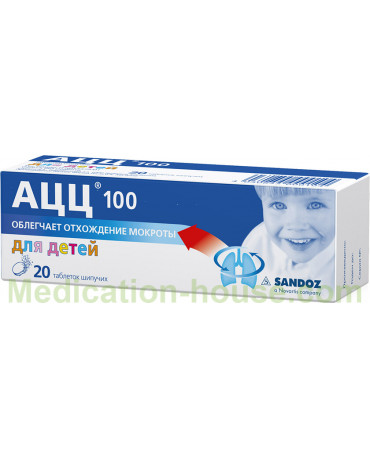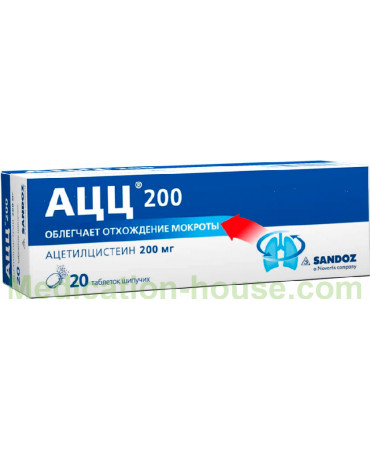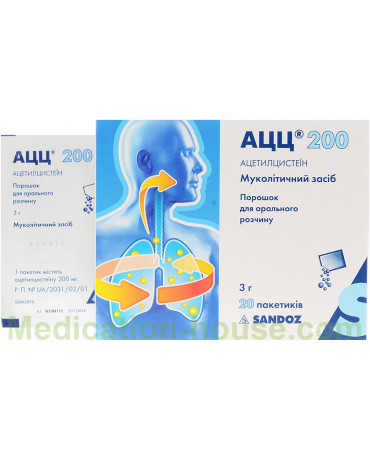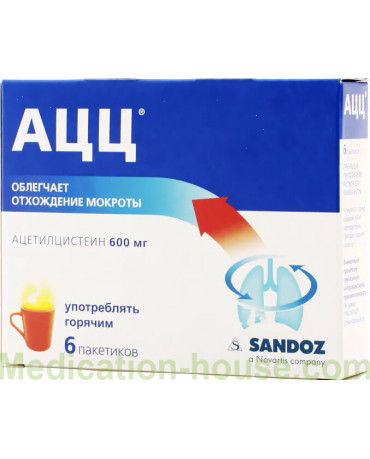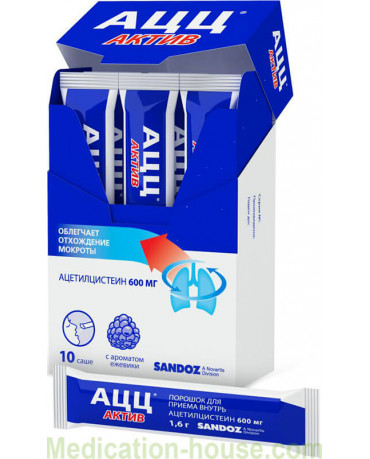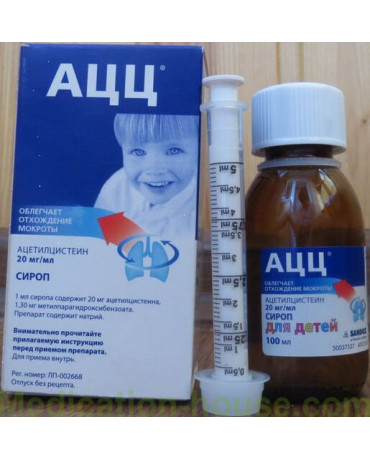Instruction for ACC Long
You can buy ACC Long here
Release form and composition
Dosage form of ACC Long - effervescent tablets: white, flat-cylindrical, round, on one side with a notch and a bevel, have a blackberry smell, possibly a faint sulfur smell; the reconstituted solution is transparent, colorless with a blackberry smell and, possibly, a weak sulfuric odor (6, 10, or 20 each in polypropylene tubes, 1 tube in a cardboard bundle).
Composition 1 tablet:
active substance: acetylcysteine - 600 mg;
auxiliary components: blackberry flavor "B" - 40 mg; anhydrous citric acid - 625 mg; sodium bicarbonate - 327 mg; mannitol - 72.8 mg; lactose - 70 mg; ascorbic acid - 75 mg; sodium citrate dihydrate - 0.45 mg; sodium saccharinate dihydrate - 5 mg; sodium carbonate - 104 mg; sodium cyclamate - 30.75 mg.
Pharmacodynamics
ACC Long is a mucolytic drug. Acetylcysteine - a derivative of the amino acid cysteine, has a mucolytic effect, facilitating the discharge of sputum, which is provided by a direct effect on its rheological properties. The action of the substance is due to the ability to break disulfide bonds of mucopolysaccharide chains, due to which there is a depolymerization of mucoproteins of sputum and a decrease in its viscosity. ACC Long remains active with purulent sputum.
The drug has an antioxidant effect, based on the ability of its reactive sulfhydryl groups (SH-groups) to bind to oxidizing radicals, due to which their neutralization is observed.
Acetylcysteine also contributes to the synthesis of glutathione, which is an important component of chemical detoxification and the antioxidant system of the body. The antioxidant effect allows you to increase the protection of cells from the damaging effects of free radical oxidation inherent in the intense inflammatory process.
In the case of prophylactic use of acetylcysteine, a decrease in the frequency and severity of exacerbations in patients with cystic fibrosis and chronic bronchitis is noted.
Pharmacokinetics
Acetylcysteine has a high absorption. Oral bioavailability is 10%, which is due to the pronounced effect of the first passage through the liver. The time to reach the maximum plasma concentration in the blood is 1-3 hours.
Plasma protein binding is 50%. The substance crosses the placental barrier. There is no information on the ability of acetylcysteine to cross the BBB (blood-brain barrier) and excreted in breast milk.
Acetylcysteine is rapidly metabolized in the liver and forms a pharmacologically active metabolite - cysteine, as well as diacetylcysteine, cystine and mixed disulfides.
Acetylcysteine is excreted by the kidneys in the form of inactive metabolites (diacetylcysteine, inorganic sulfates). The elimination half-life is approximately 1 hour.
With impaired hepatic function, the half-life increases to 8 hours.
Indications for use
ACC Long 600 mg is prescribed in the treatment of respiratory diseases that occur with the formation of viscous difficult to separate sputum, including the following diseases / conditions:
obstructive bronchitis;
bronchitis in acute and chronic course;
pneumonia, lung abscess;
laryngotracheitis, tracheitis;
bronchial asthma, chronic obstructive pulmonary disease;
bronchiectatic disease;
cystic fibrosis;
bronchiolitis;
otitis media (inflammation of the middle ear);
sinusitis in acute and chronic course.
Contraindications
Absolute:
lactose intolerance, lactase deficiency, glucose-galactose malabsorption;
pulmonary hemorrhage, hemoptysis;
peptic ulcer of the stomach and duodenum in the acute stage;
pregnancy and lactation;
age up to 14 years;
individual intolerance to the components of the drug.
Relative (diseases / conditions in which the use of acetylcysteine requires caution):
a history of stomach and duodenal ulcer;
histamine intolerance (long-term use of the drug should be avoided, since acetylcysteine affects the histamine metabolism, which can cause signs of intolerance, manifested in the form of headache, vasomotor rhinitis and itching);
bronchial asthma;
varicose veins of the esophagus;
obstructive bronchitis;
adrenal disease;
renal / liver failure;
arterial hypertension.
Instructions for use ACC Long: method and dosage
ACC Long is taken orally, preferably after a meal. The tablet must first be dissolved in 200 ml of water. The drug is recommended to be taken immediately after dissolution, as an exception, its storage for 2 hours is permissible. The intake of an additional volume of liquid leads to an increase in the mucolytic effect.
Unless otherwise prescribed by the doctor, ACC Long take 1 tablet per day.
With short colds, the duration of therapy is 5-7 days. With cystic fibrosis and chronic bronchitis, the drug is taken for a longer time to achieve a preventive effect.
Side effects
Possible adverse reactions (> 10% - very often;> 1% and <10% - often;> 0.1% and <1% - infrequently;> 0.01% and <0.1% - rarely; <0, 01% - very rarely):
respiratory system: rarely - shortness of breath, bronchospasm (mainly with bronchial hyperreactivity against the background of bronchial asthma);
digestive system: infrequently - dyspepsia, nausea, diarrhea, vomiting, stomatitis, abdominal pain;
sensory organs: infrequently - tinnitus;
allergic reactions: infrequently - lowering blood pressure, urticaria, skin itching, rash, exanthema, angioedema, tachycardia; very rarely - anaphylactic reactions up to anaphylactic shock, Lyell syndrome, Stevens-Johnson syndrome;
others: very rarely - a decrease in platelet aggregation, fever, headache, isolated reports of bleeding (associated with hypersensitivity reactions).
Overdose
The main symptoms are vomiting, diarrhea, stomach pain, nausea and heartburn.
Therapy: symptomatic.
special instructions
1 tablet corresponds to 0.001 XE (bread unit), which should be considered in patients with diabetes.
When dissolving the drug, it is recommended to use glassware and avoid contact with easily oxidized substances, rubber, metals, oxygen.
In very rare cases, severe allergic reactions were observed during therapy, which requires the abolition of ACC Long and seeking medical advice.
With bronchial asthma and obstructive bronchitis, the drug should be used with caution under systemic control of bronchial obstruction.
Immediately before bedtime (later than 18.00), the drug should not be taken.
Pregnancy and lactation
According to the instructions, ACC Long is contraindicated for use during pregnancy and lactation, due to the lack of data confirming the safety / effectiveness of therapy in this group of patients.
Use in childhood
For patients under 14 years of age, ACC Long is not prescribed.
With impaired renal function
In renal failure, the drug should be used with caution.
With impaired liver function
In case of liver failure, the drug should be used with caution.
Drug interaction
With the combined use of ACC Long 600 mg with some drugs / substances, the following effects may develop:
antibiotics for oral administration (including tetracyclines, penicillins, cephalosporins), except loracarbef and cefixime: a decrease in their antibacterial activity (it is recommended to observe the interval between their use for at least 2 hours);
drugs with an antitussive effect: suppression of the cough reflex, which can lead to stagnation of sputum;
vasodilating agents, nitroglycerin: enhancing their vasodilating effect.
Terms and conditions of storage
Store in a place protected from light and moisture, at a temperature of up to 30 ° C in a tightly closed tube. Keep out of the reach of children.
Shelf life is 3 years.
Reviews
According to reviews, ACC Long is an effective drug that significantly facilitates the discharge of viscous sputum. Adverse reactions are reported only in rare cases.
Terms of sell
You don't need a prescription to buy ACC Long.

